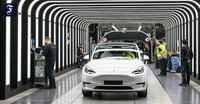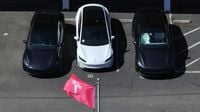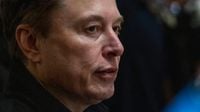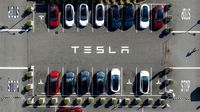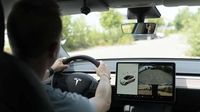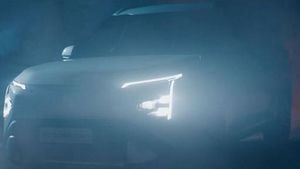Tesla is facing a significant legal challenge as allegations of odometer manipulation surface, potentially affecting over a million vehicles. A class-action lawsuit filed in California claims that Tesla has been accelerating the odometers of its electric vehicles, which could lead to customers losing warranty coverage sooner than expected.
The lawsuit, initiated by Nyree Hinton from Los Angeles, asserts that Tesla's odometers do not solely reflect the actual distance traveled. Instead, they reportedly factor in energy consumption, driving behavior, and other internal software metrics. This manipulation allegedly results in inflated mileage readings, pushing customers to incur repair costs sooner and forcing them into extended warranties.
Hinton purchased a used Tesla Model Y in December 2022, which had approximately 36,700 miles on the odometer. However, he quickly noticed discrepancies in the mileage readings. "My Tesla was showing an increase of 72 miles per day, even though I was only driving a maximum of 20 miles," he stated. This unusual spike led to his warranty expiring prematurely, ultimately resulting in a costly $10,000 repair bill for suspension work that Tesla refused to cover.
The implications of the lawsuit extend beyond Hinton's experience. According to court documents, the class-action suit seeks damages and punitive compensation for Tesla owners across California, potentially impacting more than one million vehicles. The plaintiffs argue that by tying warranty and leasing mileage limits to inflated odometer readings, Tesla is effectively increasing its repair revenues while reducing its warranty obligations.
Legal experts suggest that if the allegations are proven true, it could lead to significant financial repercussions for Tesla. The company has denied all allegations, maintaining that its odometer functionality is accurate and compliant with industry standards. Tesla has yet to publicly comment on the specifics of Hinton's case but has transferred the lawsuit from a California state court to a federal court in Los Angeles.
This is not the first time Tesla has faced scrutiny regarding its vehicle metrics. Earlier in 2024, the company was accused of overstating the range of its electric vehicles during the sales process. A judge ruled that those claims could not be pursued as a class action, forcing affected customers to file individual lawsuits instead. Whether the outcome of the current case will differ remains to be seen.
The situation raises critical questions about transparency and fairness in the automotive industry, particularly regarding electric vehicles. As Tesla continues to grow in popularity, the stakes are higher for the company to maintain consumer trust.
For Tesla drivers concerned about their vehicle's mileage, experts recommend taking several proactive steps:
- Check your odometer readings regularly, especially if you notice discrepancies.
- Review warranty conditions to understand how mileage impacts coverage.
- Stay informed about the class-action lawsuit's developments, as they could have broader implications beyond California.
- Seek legal advice if you suspect that your vehicle's odometer may be malfunctioning.
The outcome of this lawsuit could set a precedent for how automotive manufacturers are held accountable for their vehicle metrics. With over a million vehicles potentially affected, the implications are vast, not just for Tesla but for the electric vehicle market as a whole.
As the case progresses, Tesla owners will be watching closely. The allegations not only challenge the integrity of Tesla's odometer systems but also bring to light the broader issues of consumer rights and corporate responsibility in the rapidly evolving electric vehicle landscape.
In the coming months, as the court date approaches, more details are likely to emerge, shedding light on whether Tesla's practices are indeed as problematic as alleged. For now, Tesla drivers are advised to remain vigilant and informed about their vehicles' performance and warranty conditions.

